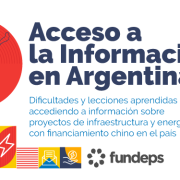Right of access in environmental matters. Towards a Latin American regional convention. Fourth meeting on focal points: negotiations begin.
The process towards international environmental governance has its origin in 1972 in the Stockholm Conference, and developed through various conferences and summits.
The process towards international environmental governance has its origin in 1972 in the Stockholm Conference, and developed through various conferences and summits. In the 1992 Rio Summit, the “Rio Declaration on Environment and Development” adopted principle 10, which refers to the rights of access in environmental matters: right to information, participation to decision-making and access to justice. This declaration, of global scope, isn’t binding on the countries, so that its operativity is needed.
For this reason, in 1998 in Europe the Aarhusen Convention was dictated, serving as an instrument that regulates and operationalize these three pillars of environmental democracy being binding on countries in Europe, Central Asia and the European Community.
Regional Convention for Latin America
In terms of Latin America, we hope that within 2015-2016 a Regional Convention operationalizing principle 10 and effectively reflecting the highest standards of access to information, participation and environmental justice will be dictated.
Many conferences and meetings have been held to advance this process, with ECLAC as Technical Secretariat. In the last four meetings on Focal Points of the signatory countries of the Declaration on the application of Principle 10 there has been a clear advance, and committed participation by the signatory countries towards the realization of this regional instrument. The first meeting was held on November 6th and 7th in Santiago de Chile, where delegates of the signatory countries agreed on a Roadmap for the full implementation of the regional convention.
The second one took place in 2013 on April 18th in Guadalajara (Mexico), and here was approved an Action Plan up to 2014 to strengthen the rights of access in environmental matters. The third one was conducted in 2013 on October 30th and 31st in Lima (Peru), and members agreed on a series of lines of action for 2014 on the empowering of capacities and cooperation.
Recently, from the 4th to the 6th of November 2014, the forth meeting of Focal Points was held in Santiago de Chile, where the representatives of the 19 countries of Latin America and the Caribbean that signed the Declaration of Principle 10 approved to start the negotiations for the creation of a regional convention in this area. From 2012 to date, the Declaration has been signed by Argentina, Bolivia, Brazil, Chile, Colombia, Costa Rica, Ecuador, El Salvador, Guatemala, Honduras, Jamaica, Mexico, Panama, Paraguay, Peru, Dominican Republic, St. Vincent and the Grenadines, Trinidad and Tobago and Uruguay. In the fourth meeting also participated as observers Antigua and Barbuda, Nicaragua and Saint Lucia.
Attendees welcomed the recent incorporation of Bolivia and El Salvador, and reminded that the process is open to all countries of Latin America and the Caribbean. During this last meeting, Alicia Bárcena, Executive Secretary of ECLAC, highlighted that the instrument should not be merely declaratory, but must be ambitious and set clear and specific legal obligations to ensure effectively the three pillars of right of acces in environmental matters: information, participation and justice. These negotiations, will have to be based on the minimum contents of San José de Costa Rica.
Through FUNDEPS will be supported the work of other NGOs in the region towards the effective implementation of the rights of access and to cooperate with governments through recommendations and/or exchanges of ideas to move towards a regional instrument support. More information: – Comunicado de prensa de la reunión de la CEPAL – Propuesta de naturaleza y contenidos del instrumento regional de principios de acceso en materia.
Contacts:
Translated by: Arianna Tamanini






